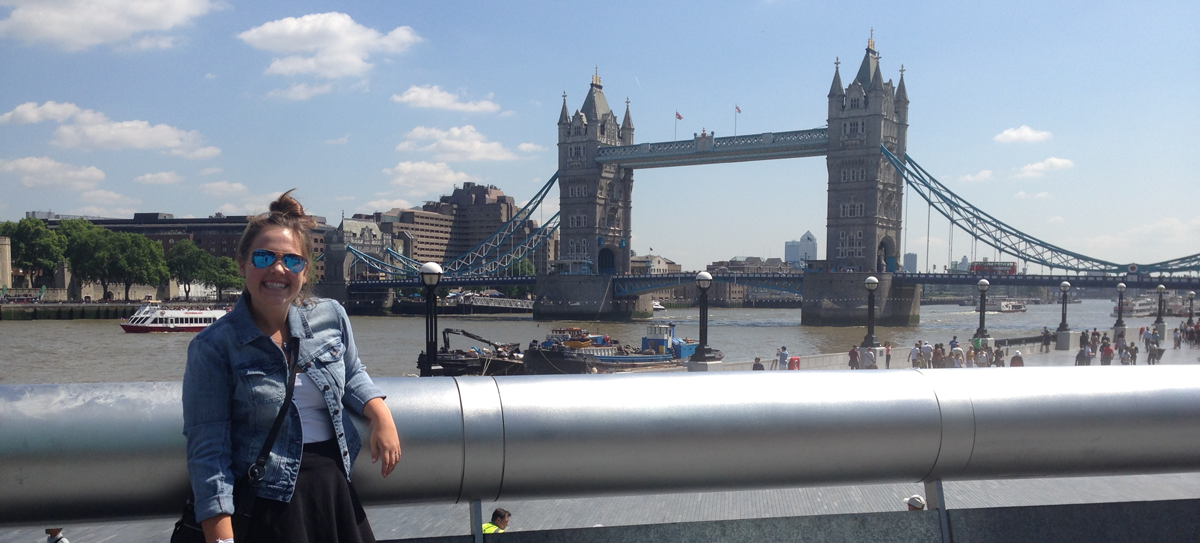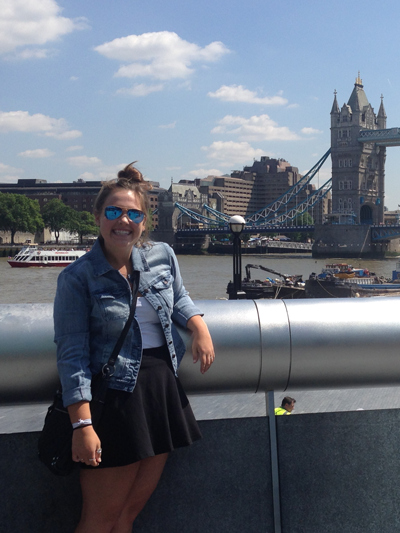Give Back: 200 for $200

Lauren Cully learning in Cal Poly's London Study Program
About 200 for $200
The English Department is looking to the future — specifically, how we can continue our legacy of success through increased support of our students and faculty. We want to sustain the excellence our alumni experienced at Cal Poly, and we want to provide even more for our current and future students.
To provide this additional layer of exceptional hands-on education, the English Department and our Alumni Advisory Board are launching a 200 for $200 initiative. Within two years, we aim to have 200 donors commit to our students, and the future of the department, through a gift of $200.
Gifts to the 200 for $200 initiative will be used in a variety of ways to provide more for students and faculty with a particular emphasis on:
Study Abroad Opportunities for Students
The English Department values study abroad opportunities for students and has created a flexible curriculum to allow majors to study abroad for one quarter or one year and still graduate in four years. Yet study abroad programs, either through Cal Poly or through another university, are costly, and thus not all interested students can take advantage of them. Your donations will help support future students living and studying in London, Paris, Rome, Cusco, Thailand or wherever their interests take them.

“In our humanities class, we would take field trips to learn about historic events from the actual places where those events took place. It's one thing to learn from a textbook in a classroom, but the learning experience is much more beneficial when you are able to actively engage in the material.”
- Amalea Sideropoulos (2015) in Cal Poly’s London Study Program

“More students should have the opportunity to study abroad because it is eye-opening to be completely immersed in a new city, a new culture, and a new way of life. It's one of the most valuable takeaways I've had from my four years at Cal Poly, and I hope that others are as lucky as I was to have such a fulfilling and enriching experience. Seeing the world changes a person in many ways, and studying abroad gives new perspectives and understandings that add so much to one's life. In this sort of setting, the focus isn't only on book learning. Studying abroad gives students a real world education too. The skills and the knowledge gained from traveling and studying abroad are beneficial in a multitude of situations.”
- Lauren Cully (2015) in Cal Poly’s London Study Program
Field Trips and Experiential Learning
Learn by Doing in English classes often involves immersing oneself in place, and many of our faculty take students on field trips near (the Getty Museum) and far (the Lake District in England). With your help, we can offer many more such trips: faculty are eager to recreate literary debates between Hemingway and Stein while sipping coffee with students in a Parisian café; to stroll the Great White Way in search of the perfect performance; to explore the National Museum of African-American History and Culture after reading Frederick Douglass, Harriet Jacobs and Toni Morrison.

“Dr. Campbell’s Literature and Landscape of the American West was the epitome of what a college literature class should aspire to. Class trips to the Steinbeck Museum, Cannery Row, and the Tor House benefitted students immensely. We study literature, in my opinion, to better understand the human experience. You read a man like Steinbeck to experience the Cannery Row — to feel the poverty and the freedom — of the 1930s. What better way to do that than standing knee deep in Doc’s tide pools, with a belly full of excellent sea food, watching as a storm rolls in? These moments ground us in the reality of what it means to be human. We’re here to better understand each other and to better understand ourselves. Every student should have access to these kinds of experiences because, simply put, they make you a better person. You can’t stand atop the bluffs of Big Sur looking down at the crashing surf and not more fully understand what Robinson Jeffers felt in writing ‘November Surf.’”
- Emily Anderson (2015)
Learn by Doing Senior Projects
For 25 years, English majors have been collaborating with art and design majors to create Byzantium, the university’s literary annual. As a senior project, this experience affords students with hands-on experience overseeing every element of producing a journal. The English Department would like to offer more such opportunities for experiential learning, including supporting students in their pursuit of creative and “outside the box” senior projects. With your help we can do so.

“The editing experience enhanced my communication skills and increased my understanding of time management. This project had so many different components to it that I don’t think I would have been able to learn in a classroom or doing any other project. As an English major, it was refreshing to have a senior project option that was so hands on and resulted in a tangible product to show future employers.”
- Monique Nicholas (2015), co-editor of Byzantium 25
Conferences/Professionalization Opportunities
Many English majors and master’s students decide to pursue further education, either for professional or personal reasons. Especially in our graduate program, we are constantly seeking ways to help students better understand the world of higher education. One such opportunity is through academic conference presentations. We already support graduate student travel to conferences in a limited way, but with your help, we can provide even more support for our students. This past year we were lucky enough to host a conference for the Western Society for Eighteenth Century Studies (WSECS). Our graduate students enjoyed a rare opportunity not only to present at a conference, but also to help organize and deliver one.

“By participating in WSECS, I was able to participate in and experience the culture of academia as well as receive valuable feedback about my own research. Speaking about my ideas to a room full of scholars was quite possibly one of the most difficult experiences of my graduate career, but it also allowed me to experience a conference on my ‘own turf’ (Cal Poly). I have since been able to attend other conferences with more confidence and awareness of what to expect.”
- Marin Smith (M.A., English, 2015)
Faculty Excellence
The English Department has always boasted outstanding teachers and renowned scholars. And the two go hand-in-hand: an ambitious research agenda promotes better teaching. In order to create new knowledge, faculty often need to travel to archives and museums as well as to conduct interviews. We can achieve this with your help.

“For the past 12 years, I've interviewed more than 100 people who worked in animation studios during the 1930s-1960s. My new book, ‘Three Years in Wonderland,’ a nonfiction account of animators and art directors who created the first wave of ‘themed’ amusement parks, will be published later this year by the University of Mississippi Press. I'm deeply grateful for travel and research funds to help me engage these archival materials and to pursue research and creative projects, information that then informs classes I teach at Cal Poly.”
- Todd Pierce, Professor

“I have benefited from research trips to London and to New York City to conduct archival research, which is an essential part of literary scholarship. It works in combination with close reading and critical-theoretical analysis to ground our studies in historical data and documentation. And, it makes our classes better: more cutting-edge, more original. Because of these trips, my students have been able to work with materials that no other students (or even professors) in America have probably seen.”
- Catherine Waitinas, Associate Professor